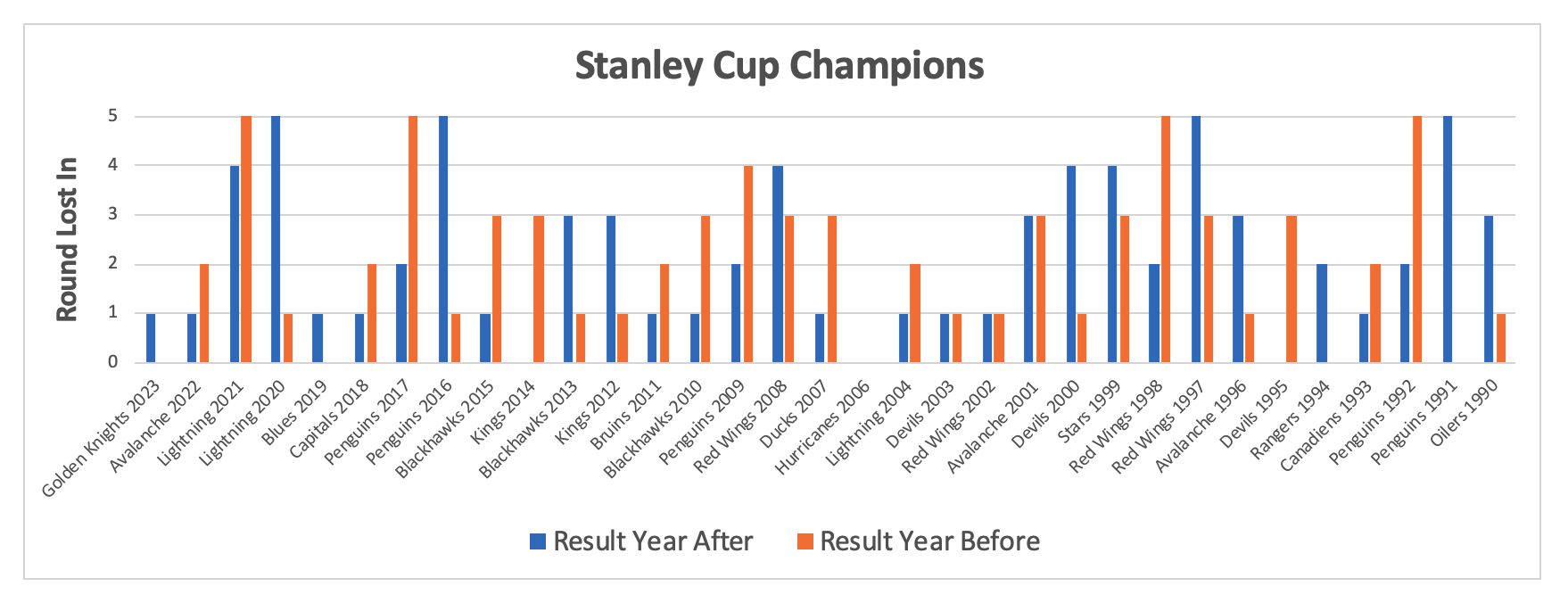Florida Panthers Defy the Runner-Up Odds
It is no secret that the Florida Panthers have been a great hockey team for four seasons now, achieving a Presidents Trophy, two Prince of Whales trophies, and potentially the 2024 Stanley Cup in this span. Despite this, past trends would indicate that it is a surprise that they are once again competing for the Stanley Cup the year after they lost in the Stanley Cup Finals.
In 1984, the Edmonton Oilers returned to the finals after losing in the finals the previous year. They would avenge the Islanders and win their first of many Stanley Cups. In between the 1984 Oilers and the 2024 Florida Panthers, the 2009 Pittsburgh Penguins are the only team to lose in the Stanley Cup Finals and return to them in the following season, as the Penguins had lost in the finals to the Red Wings in 2008.
On the other had, Stanley Cup champions don’t have nearly the same struggle returning to the finals the following season. In this same time span since 1984, the following Stanley Cup winners returned to the finals the following season:
List of Stanley Cup Winners since 1984 to return to the finals the following year.
As seen, there have been 10 occurrences of Stanley Cup winners returning to the finals in the following year, much higher than the three occurrences of teams that lost in a Stanley Cup Finals.
Additionally, teams that make it to the finals and lose generally have a worse result in the following year. Since 1990, runner-ups win an average of 0.67 rounds the following season, with a median result of zero rounds won (this includes both first round exits and playoff misses). On the other hand, defending champions win an average of 1.3 rounds the following season, with a median result of one round win, or in other words, losing in the second round. Graphically, we can see that Stanley Cup winners generally do better in the previous and following seasons.
Note: If the “round lost in” value is zero, and therefore no visible bar, it means that team missed the playoffs. If the “round lost in” value is five, it means that team won the Stanley Cup.
Panthers 2023*: Season not yet completed in year after, the result will either be 4 or 5. Value currently set at 4.5 to signify this.
Golden Knights 2018*: Inaugural season for the Golden Knights, therefore there is no previous year data.
Why do Stanley Cup Champions seem to do so much better the following season than their fellow runner-up? An easy explanation is that Stanley Cup winners won for a reason, and truly are the best team in the league, and will therefore have sustained success. Another explanation could be the mentality. Stanley Cup winners may be playing under less pressure the following season knowing that whatever happens, they at least won a recent Stanley Cup. Even if there is pressure, perhaps they have the confidence to do it again knowing that they are capable. On the other hand, a runner-up team may have a “bad” feeling, as they just barely come up short despite all the work put in, which could be demotivating for the following season. Or perhaps as an opposite point to the Stanley Cup winners, maybe there are more “surprise” teams that go to the finals and fall short, and end up over performing compared to what they are truly capable of. An example of this are the 2021 Montreal Canadiens, who had a mediocre season, a sudden burst of great play that got them to a runner-up position, only to finish dead last in the league the following year.
No matter what the reason is for runner-ups to generally perform worse in the following season than the Cup champion, the 2024 Florida Panthers overcame this trend and are looking at redemption for the Stanley Cup.
For a full 2024 Stanley Cup Finals analysis, please visit the services page, or click here to visit the product directly. If you want to see how the Oilers overcame an unpromising trend similar to the Panthers, check out our article by clicking here.



